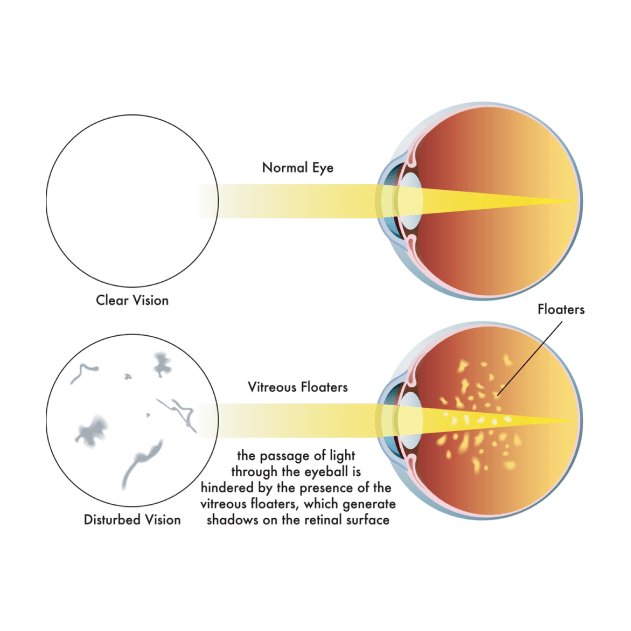
Floaters and Flashes
Floaters are small specks or blobs that float across your field of vision. They can appear as dots, cobwebs, or other irregular shapes. They are more noticeable when looking at a blank surface such as a white wall or blue sky.
Flashes are brief sudden bursts of light, often described as flickering, lightning bolts, or a camera flash in your side vision. They are more noticeable in the dark and can even be seen when the eye is closed.
What causes floaters and flashes?
The eye cavity is filled with a clear gel-like substance called vitreous. As a person ages, this gel becomes more liquid, and the fibres in the vitreous clump together. These clumps float around in the vitreous and appear as moving specks or blobs in your vision called floaters.
As the vitreous becomes more liquid, it shrinks in size and separates away from the retina, the light-sensitive tissue that lines the back of the eye. This is known as a Posterior Vitreous Detachment (PVD). As the vitreous separates it can tug and stimulate the retina resulting in the perception of light flashes. Occasionally, as the vitreous pulls away from the retina it can cause a small retinal tear. If not treated, this can lead to retinal detachment which can result in permanent loss of vision.
Although the most common cause of floaters and flashes is age, certain conditions such as myopia (short-sightedness) or ocular trauma can increase the risk of retinal tears and detachments.
Retinal tears and detachments are serious eye conditions that require immediate treatment. They can cause similar symptoms to a PVD. If you notice any sudden floaters or flashes it is important to see an eye specialist immediately for a full retinal examination.


Floaters and flashes treatment
Floaters, flashes, and PVD are a normal aging process and in most cases do not require any treatment. If the vitreous separates from the retina without causing any problems, in most cases floaters and flashes gradually become less noticeable over time.
If there is a small tear present, laser treatment may be required to seal the tear and prevent a retinal detachment.
To read more about retinal laser treatments click here
If there is a retinal detachment present that cannot be treated with laser, a surgical procedure called a vitrectomy is required.
To read more about vitrectomy click here
